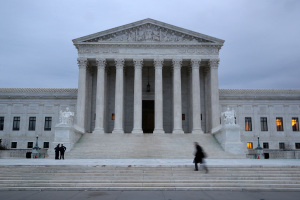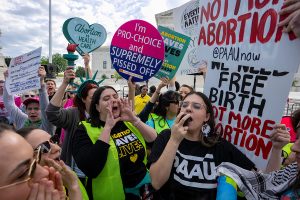Supreme Court allows Idaho to enforce abortion law in first abortion ruling since Dobbs

Idaho's abortion law can go into effect while a legal battle continues, according to a recent order from the U.S. Supreme Court in a case that marks the first time that the court has weighed in on a state's criminal law on abortion since it overturned Roe v. Wade in 2022.
The Supreme Court determined Friday that Idaho could enforce the Defense of Life Act, which outlaws most abortions except in specific circumstances. Under the law, a provider who conducts an abortion can face up to five years in prison and the suspension or revocation of his or her license.
Idaho enacted the law in 2020, and after the Supreme Court reversed Roe in 2022, restoring regulatory authority over abortion to the states, the law could go into effect.
The court agreed to hear arguments in April about the issue, putting on hold a lower court ruling based on an August 2022 lawsuit filed by the Biden administration that claimed the state's abortion ban interfered with a federal law requiring hospitals that receive Medicare funds to provide emergency care.
The U.S. Justice Department argues that the law forces doctors to violate the Emergency Medical Treatment and Labor Act. A lower court sided with the administration and blocked the Idaho law.
Brandi Swindell, founder and CEO of Stanton Healthcare, a pro-life medical clinic in Idaho, applauded the Supreme Court for upholding the Defense of Life Act, which she stated "protects innocent children from abortion violence and women from abortion abuse." Swindell said the law allows for abortion exceptions if the pregnancy poses a threat to the mother's life or is a result of rape or incest.
"It is critical that Idaho's emergency rooms are not turned into 'abortion clinics,'" Swindell said in a Monday statement provided to The Christian Post.
"At Stanton Healthcare, we will continue to provide exceptional medical care, tangible support and hope to women facing unexpected pregnancies as we work to make abortion unthinkable and end abortion abuse," she continued.
On Friday, the White House issued a statement in response to the Supreme Court's decision. President Joe Biden called on Congress to restore the "protections of Roe v. Wade" and referred to Idaho's abortion law as "dangerous." He repeated the administration's assertion that the law will make it harder for doctors to provide emergency medical care.
"These bans are also forcing doctors to leave Idaho and other states because of laws that interfere with their ability to care for their patients," Biden stated. "This should never happen in America."
"The Vice President and I believe that health care decisions should be made by women and their doctors, not politicians. We will continue to defend a woman's ability to access emergency care under federal law," the president continued. "As this case continues, the stakes could not be higher for women across America. Congress must immediately restore the protections of Roe v. Wade so that women in every state can access the health care they need."
According to Idaho's Defense of Life Act, an abortion is not a criminal act if a provider determines, based on "good faith medical judgment," that an abortion is necessary to save the life of the mother. However, the law clarifies that this judgment only applies to cases where the woman's physical health is at risk and not her mental health.
In addition, medical care that unintentionally results in the death or injury of the unborn child is not a violation of the law. The Defense of Life Act also states that women will not be prosecuted for having or attempting to have an abortion.
Samantha Kamman is a reporter for The Christian Post. She can be reached at: samantha.kamman@christianpost.com. Follow her on Twitter: @Samantha_Kamman





























